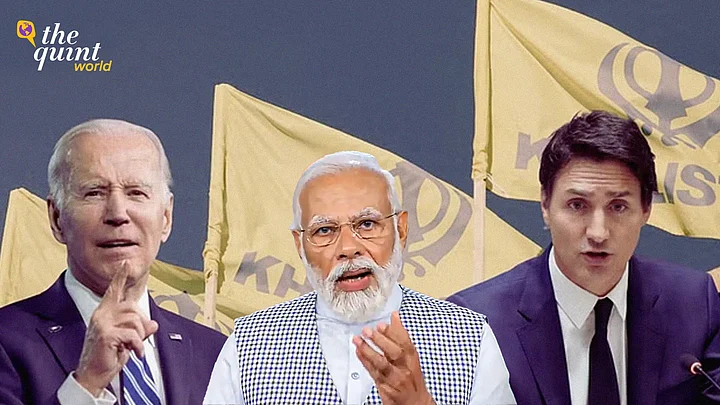Do your bit to support our journalism. Become a member – and help us stay on top of the most important stories.
Almost a week after Canadian PM Justin Trudeau alleged a possible Indian involvement in the assassination of Sikh separatist Hardeep Singh Nijjar in June, confirmed reports of shared intelligence emerged from the ‘Five Eyes’ alliance that made Trudeau speak up on the issue in his own Parliament.
The disclosure of a shared intelligence input, with the confirmation coming from the US Ambassador to Canada, brings a larger focus on New Delhi’s relations with the West in the coming election year.
Domestic context matters more for Modi and the BJP at this point though. The anti-West, decolonisation sentiment is riding high in India’s hyper-nationalist socio-political domestic scenario.
The recently concluded G20 summit was hailed as a success for India’s assumed role in ‘anchoring’ the concerns of the developing Global South.
The ability of New Delhi to get a declaration passed in a highly uncertain, multi-polar global power dynamics - while getting China and Russia on board - strengthened India’s case as a strategically important actor that can ally with the West and members in the East too.
Why the West is Vital for India
For the West, India is vital for its plan in Asia, to counter China and give access to investment/trade frontiers for a debt, recession-affected Europe, and so countries like the US and those in the EU were more accommodative to let India get a win on the deliverables it sought out to achieve as part of the summit.
Now, a toughened stance against Canada - and the disproportionate blowing up of the Khalistan issue domestically - may simply appear to be part of a domestic electoral strategy for Modi to score ‘high’ in an election year where the search for a ‘foreign enemy’ helps develop a cohesive national (security) narrative for the BJP. Remember how it was Pakistan that was vilified, post-Pulwama (sans evidence), in the run-up to the 2019 Lok Sabha election.
But Canada is not Pakistan. We are talking here about a G7 member country that is a close ally to the US and is part of the industrially advanced world which is also a significant destination for India’s skilled (e)migration pattern, from young students to mid-career professionals which allows higher remittances into India, even though India’s own export/import-trade exposure to Canada is less than 1 percent of its overall export share.
The Khalistan issue too isn’t that big a concern in defining the domestic politics of India or of/in Punjab’s Sikh community at this point.
And so, what’s rather more vital for New Delhi to consider is the larger implications of its unwarranted toughened, tit-for-tat aggressive posture against Canada which shouldn’t endanger its relations with the West, and vice-versa.
3 Important Lessons
From the West’s perspective, in context to the current bilateral tension between Canada and India, some things are becoming clear even if the truth remains shrouded in the fog of allegations and counter-allegations.
First, the US, the UK and Canada’s other key allies are reluctant to burn bridges with India, which they see as a vital partner in balancing the rise of China.
Second, it would equally be naïve to expect that this time around, the US and its friends will pick India over Canada. The very architecture and credibility of the US-led alliance system hinges on members standing by each other on questions of national security, whatever may happen. Canada’s Five Eyes partners aren’t just passively sticking by Ottawa, they are actively sharing intelligence that helps Trudeau strengthen his case against India.
This brings us to the third, and most important lesson from the past week. For all the public bonhomie that Western leaders demonstrate when meeting Indian counterparts or speaking of ties with New Delhi, they’re only too happy to snoop on their friends.
Also, if India doesn’t handle this moment more deftly through instruments of quiet, back-channel diplomacy with Canada and its security collaborators (the ‘Five Eyes’), it risks of being increasingly viewed in the West as an ‘undependable friend’.
New Delhi will then find it tougher to get the West’s support on some of the other key issues, such as its balancing game with Russia and Ukraine, facing China and its security risk in its own neighbourhood in South Asia, finding partners for capital mobility and technology-transfers that are key to India’s economic growth engine (where the US is a key partner), and finally, being able to stick to the implementation of its own promises driven by different multilateral and plurilateral platforms (including the G20).
As a senior journalist reports, “Hugging world leaders and speaking in their parliaments might create feel-good moments for cameras, but the frost in India-Canada ties is a reminder that at the end of the day, international diplomacy is still very much a game of ‘gotcha’ — and India.”
(Deepanshu Mohan is Professor of Economics and Director, Centre for New Economics Studies (CNES), Jindal School of Liberal Arts and Humanities, O P Jindal Global University. This is an opinion piece and the views expressed are the authors' own. The Quint neither endorses nor is responsible for them.)
